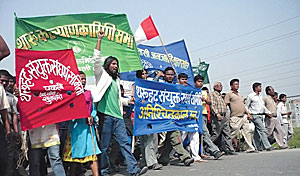 |
Someone shouted: "Stop it." Two young activists threw stones at the jeep. The army man inside hid for cover. The front window pane was shattered. The driver immediately shot into reverse gear, put one hand on the horn, and drove straight back into Tundikhel.
The crowd went silent for a minute, with a leader asking who threw the stone. A middle-aged protestor remarked calmly: "This is what happens when you wake up someone who is sleeping. Everyone thinks we are stupid and will not do anything. Here is the answer."
And what an answer it has been. The first thing to recognise and accept is that the Tharu agitation is genuine and adds political strength to all those who seek change. Except the Dalits and perhaps the Muslims, the Tharus are the most suppressed group in the country. Irrespective of the trigger, their assertion marks a great leap towards political empowerment.
It does not matter who is backing the movement-UML, NC, the Maoist Tharu front that realised they would lose out by keeping silent, or international players. Remember the royalists said the April movement was solely India-backed and donor funded? Remember the Maoists said the Madhes movement was a conspiracy of royalists and Hindutva types? The Madhesi leadership gribes that the Tharu protests are a Pahadi conspiracy, but the key point is that at its root, this is a movement born out of discrimination and anger. And, it will have a major impact on national politics.
For one, the Tharus have emerged as a powerful new force. They maybe using other parties but like other ethnic movements in Limbuwan and Madhes this process will finally weaken central authority and national parties. The road to popularity in the western Tharu belt lies in opposing Kathmandu, not in allying with the capital.
The Maoists may be happy they have exposed the contradiction between Tharus and Madhesis. But finally, it will be the Maoists who will lose out the most in their west Tarai stronghold as newer Tharu parties take root. The former rebels should wake up to their steadily diminishing credibility with the same ethnic groups they once mobilised.
But the Tharus will have to make strategic choices. Their real enemy is the state structure that made them landless and, despite the facade of democratisation, rarely gave them rights. As Bidyanand Lekhi told us at the march: "There is not a single Tharu CDO. We have no access to power. In everything, we want seven per cent representation. This movement is no longer about only withdrawing the Madhesi tag. It is about winning equal rights and representation."
The Tharus have allied with other ethnic groups, but there are already murmurs that the Gurung-Newar-Sherpa dominated NEFIN has done little for them. A Tharu journalist told us, "NEFIN participated in Kathmandu for publicity. But they did not release circulars to districts to back the protests. We don't trust them completely."
While the movement's present targets are the over-ambitious, insular and narcissistic Madhesi leaders, the Tharus and Madhesis know they will have to cooperate, if for nothing else than the sake of eastern Tharus and western Madhesis. They live together, speak common languages, share similar grievances and will share and compete for power once federalism sets in, regardless of the number of provinces in Tarai.
That is why the Tharu leadership will have to ally smartly with groups according to circumstances. The leaders are a mix of Pahadi party loyalists (Lekhi), Madhesi party defectors (Biswas), conservatives (Dahit), Maoist defectors who are strong but untested (Laxman) and thugs. Notice that the background is similar to those who initiated the Madhes movement. How this dubious leadership channels genuine aspirations will be critical.
Third, the movement has given a glimpse of how the CA will be utterly irrelevant when it comes to deciding key issues like federalism. Yes, the government never took the controversial ordinance to the house. But it is clear, whether we like it or not, that key players have more faith in the streets than in elected representatives who usually react rather than set the agenda.
Crucially, the Tharu movement is further proof of the present Nepali paradox of deepening democracy with a weakening centre. How Kathmandu's leadership reconciles disparate ethnic interests while maintaining a coherent state and writing a new constitution is the big question.



